unit6北师大版重点短语和句式
八年级英语上册知识讲义-Unit 6 The Unexplained lesson 17 -北师大版
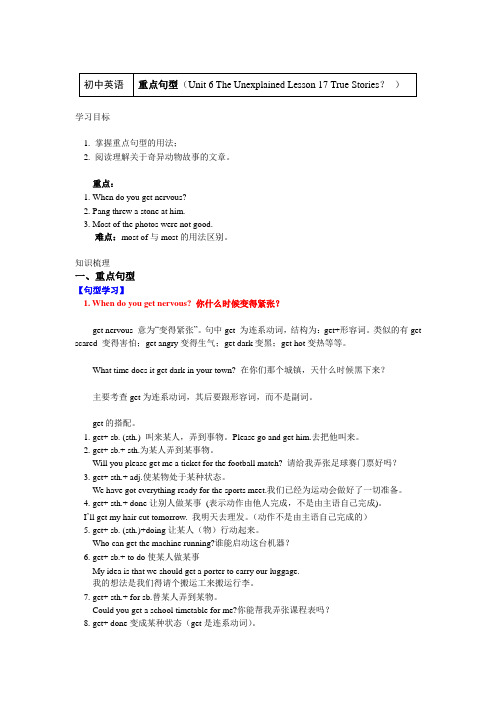
学习目标1. 掌握重点句型的用法;2. 阅读理解关于奇异动物故事的文章。
重点:1. When do you get nervous?2. Pang threw a stone at him.3. Most of the photos were not good.难点:most of与most的用法区别。
知识梳理一、重点句型【句型学习】1. When do you get nervous? 你什么时候变得紧张?get nervous 意为“变得紧张”。
句中get 为连系动词,结构为:get+形容词。
类似的有get scared 变得害怕;get angry变得生气;get dark变黑;get hot变热等等。
What time does it get dark in your town? 在你们那个城镇,天什么时候黑下来?主要考查get为连系动词,其后要跟形容词,而不是副词。
get的搭配。
1. get+ sb. (sth.) 叫来某人,弄到事物。
Please go and get him.去把他叫来。
2. get+ sb.+ sth.为某人弄到某事物。
Will you please get me a ticket for the football match? 请给我弄张足球赛门票好吗?3. get+ sth.+ adj.使某物处于某种状态。
We have got everything ready for the sports meet.我们已经为运动会做好了一切准备。
4. get+ sth.+ done让别人做某事(表示动作由他人完成,不是由主语自己完成)。
I’ll get my hair cut tomorrow. 我明天去理发。
(动作不是由主语自己完成的)5. get+ sb. (sth.)+doing让某人(物)行动起来。
Who can get the machine running?谁能启动这台机器?6. get+ sb.+ to do使某人做某事My idea is that we should get a porter to carry our luggage.我的想法是我们得请个搬运工来搬运行李。
初二英语上册(北师大版)Unit 6 Celebrations 知识点总结
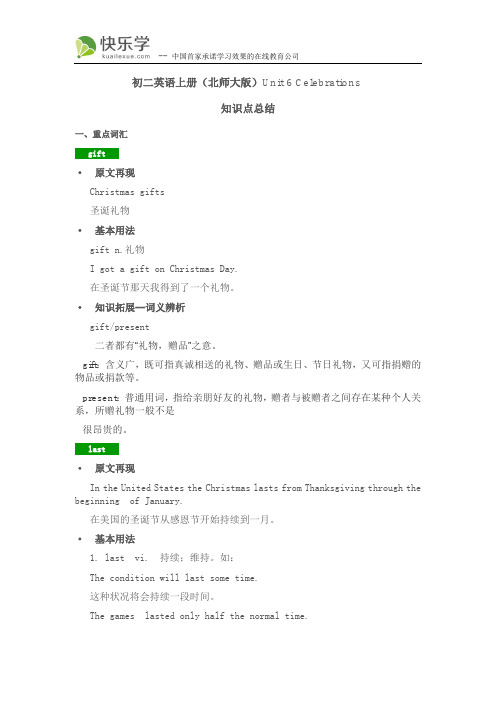
初二英语上册(北师大版)Unit 6 Celebrations知识点总结一、重点词汇gift·原文再现Christmas gifts圣诞礼物·基本用法gift n.礼物I got a gift on Christmas Day.在圣诞节那天我得到了一个礼物。
·知识拓展--词义辨析gift/present二者都有“礼物,赠品”之意。
gift:含义广,既可指真诚相送的礼物、赠品或生日、节日礼物,又可指捐赠的物品或捐款等。
present:普通用词,指给亲朋好友的礼物,赠者与被赠者之间存在某种个人关系,所赠礼物一般不是很昂贵的。
last·原文再现In the United States the Christmas lasts from Thanksgiving through the beginning of January.在美国的圣诞节从感恩节开始持续到一月。
·基本用法1. last vi. 持续;维持。
如:The condition will last some time.这种状况将会持续一段时间。
The games lasted only half the normal time.比赛只持续了通常时间的一半。
2. last adj. 最后的。
如:I am the last one to come here.我是最后一个来这的。
celebrate·原文再现Christmas celebrates the birth of Jesus Christ.圣诞节是庆祝耶稣基督的诞生。
·基本用法celebrate v.庆祝,歌颂,赞扬(过去式:celebrated 过去分词:celebrated 现在分词:celebrating 第三人称单数:celebrates)Tom celebrated his 24th birthday two days ago.汤姆两天前庆祝了他的24岁生日。
北师大版七年级英语下册 Unit 6 笔记
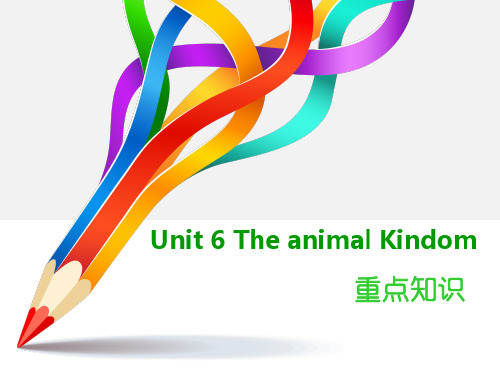
三、知识梳理
2. look funny. 其中 look 是一个联系动词,意思是 “看起来...”,后面通常接形容词充当表语。类似的 词还有 smell, sound, taste, feel. 它们是表示感官 的动词。例如: He looks excited these days because he is going to Disneyland in Hong Kong. 因为他将要 去香港迪士尼乐园玩,所以这些天他看起来很兴奋。 These peaches taste delicious and will be sold out soon. 这些桃子尝起来很好吃,很快就会卖光的。 The movie sounds interesting, so let's go to see the movie tonight. 这部电影听起来挺有趣,今 晚我们去看看吧。
三、知识梳理
7. look after “照顾;照看”,其同义词组为 take care of. 8. knock...down把...撞到;knock on/at 敲(门)。 9. suddenly "突然地",其形容词为 sudden. 10. mouse 的复数为 mice. 11. use 的副词为 useful. 12. monkey 的复数为 monkeys. 13. help 的形容词为 helpful. 14. free 的副词为:freely. 15. easy 的副词为:easily.
一、重点短语
14. not... any more 不再 15. knock down 撞倒 16. a few years later 几年以后 17. turn around 转身 18. walk through the zoo 走过动物园 19. all the time 一直;总是 20. keep homes safe 保护家园安全 21. get into trouble 陷入困境;惹上麻烦 22. take him to the beach 带他去海边 23. take him home 带他回家 24. take him for a walk 带他散步 25. walk slowly 慢慢地走
北师大版八年级上册英语 Unit 6 词汇与语法基础(解析版)
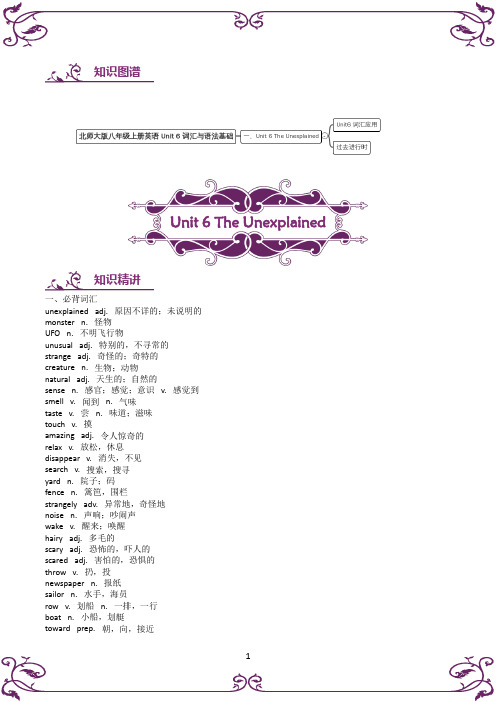
例句:
Tragedy touched their lives when their son was 16.
他们儿子16岁那年,他们的生活中发生了悲剧。
The TV report about the children's work for charity touched thousands of people's hearts.
证明,证实
例句:
Computers have been used to prove mathematical theorems.
计算机被用于证明数学定理。
That theory was proved false.
那个理论被证实是错误的。
5. sense noun /sens/
1). an ability to understand, recognize, value, or react to something, especially any of the five physical abilities to see, hear, smell, taste, and feel
你预感他们会作何反应?
The helicopters hovering overhead added to the sense of urgency.
头顶盘旋的直升机加重了紧迫感。
3). one of the possible meanings of a word or phrase含义,意义
例句:
碰,触摸
例句:
That paint is wet - don't touch (it).
那块油漆没干——别碰(它)。
He touched the girl on the arm to get her attention.
北师大版英语八年级上册Unit 6 The Unexplained重难点知识归纳总结
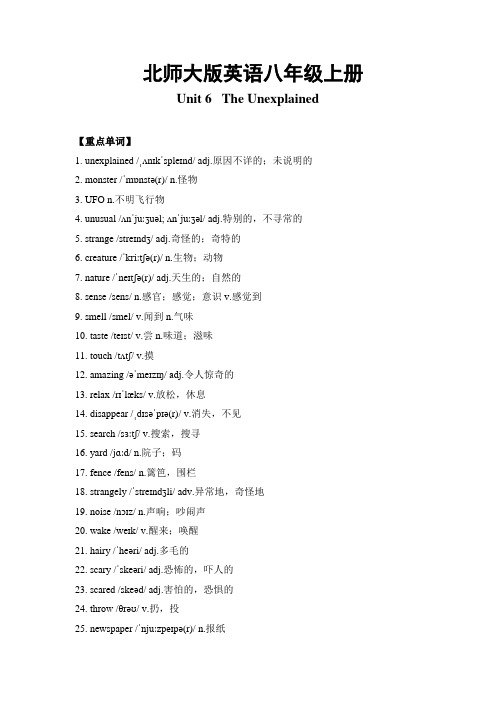
北师大版英语八年级上册Unit 6 The Unexplained【重点单词】1. unexplained /ˌʌnɪkˈspleɪnd/ adj.原因不详的;未说明的2. monster /ˈmɒnstə(r)/ n.怪物3. UFO n.不明飞行物4. unusual /ʌnˈjuːʒuəl; ʌnˈjuːʒəl/ adj.特别的,不寻常的5. strange /streɪndʒ/ adj.奇怪的;奇特的6. creature /ˈkriːtʃə(r)/ n.生物;动物7. nature /ˈneɪtʃə(r)/ adj.天生的;自然的8. sense /sens/ n.感官;感觉;意识 v.感觉到9. smell /smel/ v.闻到 n.气味10. taste /teɪst/ v.尝 n.味道;滋味11. touch /tʌtʃ/ v.摸12. amazing /əˈmeɪzɪŋ/ adj.令人惊奇的13. relax /rɪˈlæks/ v.放松,休息14. disappear /ˌdɪsəˈpɪə(r)/ v.消失,不见15. search /sɜːtʃ/ v.搜索,搜寻16. yard /jɑːd/ n.院子;码17. fence /fens/ n.篱笆,围栏18. strangely /ˈstreɪndʒli/ adv.异常地,奇怪地19. noise /nɔɪz/ n.声响;吵闹声20. wake /weɪk/ v.醒来;唤醒21. hairy /ˈheəri/ adj.多毛的22. scary /ˈskeəri/ adj.恐怖的,吓人的23. scared /skeəd/ adj.害怕的,恐惧的24. throw /θrəʊ/ v.扔,投25. newspaper /ˈnjuːzpeɪpə(r)/ n.报纸26. sailor /ˈseɪlə(r)/ n.水手,海员27. row /rəʊ/ v.划船 n.一排,一行28. boat /bəʊt/ n.小船,划艇29. toward /tə'wɔːd/ prep.朝,向,接近30. dive /daɪv/ v.跳水,潜水31. side /saɪd/ n.边缘;一边,一侧32. imaginary /ɪˈmædʒɪnəri/ adj.想象中的,虚构的33. might /maɪt/ v.可能;可以34. prove /pruːv/ v.证明,证实35. brain /breɪn/ n.脑36. asleep /əˈsliːp/ adj.睡着的37. probably /ˈprɒbəbli/ adv.很可能38. human /ˈhjuːmən/ n.人39. common /ˈkɒmən/ adj.普通的,常见的40. realise /'rɪəlaɪz/ v.意识到,领会41. radio /ˈreɪdiəʊ/ n.无线电广播42. pyjama /pəˈdʒɑːmə/ m.睡衣裤【重点短语】1. right now 现在;立刻,马上2. in fact 事实上,实际上3. wake up 叫醒;醒来4. take sb for a walk 带某人去散步5. search for 寻找6. run around 东跑西跑7. walk away 走开8. on holiday 在度假9. take out 拿出来10. come up 上升,发生,开始11. ride a bicycle 骑自行车12. dream about 梦想,梦到13. right now /at once 马上14. fly over 飞过15. make friends with 和……交朋友16. wait for 等待17. run after 追逐,追赶18. forget to do sth 忘记要去做某事19. be mixed up 混杂,搞混,弄糊涂20. go away 走开,离开21. arrive at 到达22. again and again 再三地,反复地【重点句型】1. You can see, smell, taste and feel cheese but you can’t hear it!你可以看、闻、尝和感觉奶酪,但你却听不到它!2. —Were they doing their homework when I went shopping?我去购物的时候他们在做作业吗?—Yes, they were.是的,他们在。
北师大版高中英语必修二 Unit6 重难点知识归纳总结

北师大版高中英语必修二Unit 6【重点单词】1.abstract /'æbstrækt/ adj. 抽象的;深奥的2.straight /streɪt/ adj. 直的;直接的3.wavy /weɪvɪ/ adj. 波状的4.imagination /ɪ'mædʒɪneʃ(ə)n/ n. 想象,想象力5.painter /'peɪntə/ n. 画家,油漆匠6.pain /peɪn/ n. 痛苦;疼,痛7.exhibition /eksɪ'bɪʃ(ə)n/ n. 展览会8.poetry /'pəʊɪtrɪ/ n. 诗(总称)9.missile /'mɪsaɪl/ n. 导弹10.shade /ʃeɪd/ n. 阴影;阴暗处11.sweat /swet/ n. 汗12.youth /juːθ/ n. 青春;年轻人13.insect /'ɪnsekt/ n. 昆虫14.creature /'kriːtʃə/ n. 动物;人15.artist /'ɑːtɪst/ n. 艺术家;画家16.valuable /'væljʊəb(ə)l/ adj. 贵重的;有价值的17.typical /'tɪpɪk(ə)l/ adj. 典型的18.elegantly /'eləɡəntlɪ/ adv. 优美地19.emphasis /'emfəsɪs/ n. 强调20.detail /'di:teɪl/ n. 细节;详情21.cloth /klɒθ/ n. 布,布料22.fold /fəʊld/n. 皱褶23.shallow /'ʃæləʊ/ adj. 浅的24.shore /ʃɔː/ n. 岸边25.eyesight /'aɪsaɪt/ n. 视力26.marble /'mɑːb(ə)l/ n. 大理石27.concrete /ˈkɒŋkriːt/ n. 混凝土28.feature /'fiːtʃə/ n. 特征,特色29.balcony /'bælkənɪ/ n. 阳台30.roof /ruːf/ n. 房顶31.statue /'stætju:/ n. 雕像32.castle /'kɑːs(ə)l/ n. 城堡33.skyscraper /'skaɪskreɪpə/ n. 摩天大楼34.angel /'eɪndʒ(ə)l/ n. 天使35.architect /'ɑːkɪtekt/ n. 建筑师36.ruin /ruːɪn/ vt. 毁坏;毁灭37.fairytale /'feərɪteɪl/ n. 童话38.café /'kæfeɪ/ n. 咖啡馆39.phoenix /'fi:nɪks/ n. 凤凰40.rooster /'ruːstə/ n. 公鸡,雄鸡41.bat /bæt/ n. 蝙蝠42.tomb /tuːm/ n. 坟墓43.dynasty /'dɪnəstɪ/ n. 朝代,王朝44.religious /rɪ'lɪdʒəs/ adj. 宗教的;虔诚的45.purpose /'pɜːpəs/ n. 目的;意图46.pattern /'pæt(ə)n/ n. 式样;模式47.character /'kærɪktə/ n. 字;字体48.happiness /'hæpɪnɪs/ n. 幸福;快乐49.temple /'temp(ə)l/ n. 庙宇;寺庙50.offering /'ɒfərɪŋ/ n. 供品,祭品51.jewellery /'dʒuːəlrɪ/ n. (总称)珠宝52.cottage /'kɒtɪdʒ/ n. 村舍;小屋53.rent /rent/ n. 租金ndlord /læn(d)lɔːd/ n. 房东55.worm /wɜːm/ n. 虫,小虫56.pipe /paɪp/ n. 管子57.mercy /'mɜːsɪ/ n. 慈悲;怜悯;同情心58.washroom /'wɒʃrʊm/ n. 盥洗室59.damp /dæmp/ adj. 潮湿的60.bathtub /'bɑ:θtʌb/ n. 浴缸,澡盆61.basement /'beɪsmənt/ n. 地下室62.bathe /beɪð/ v. 洗澡;沐浴63.fence /fens/ n. 栅栏;围墙64.narrow /'nærəʊ/ adj. 狭窄的65.garage /'ɡærɪdʒ/ n. 车库66.garbage /'ɡɑːbɪdʒ/ n. 废物;垃圾67.apartment /ə'pɑːtmənt/ n. (美)公寓住宅68.subway /'sʌbweɪ/ n. (美)地铁69.downtown /'daʊntaʊn/ adv. 在市区;adj. 市区的70.lorry /'lɒrɪ/ n. 卡车;载重汽车71.curtain /'kɜːt(ə)n/ n. 窗帘72.conclusion /kən'kluːʒ(ə)n/ n. 结论;结束【重点短语】1.fix one’s eyes on 凝视2.(be) of value 有价值的3.in detail 详细地;充分地4.sort of 有几分;有点5.date back to/date from 追溯到6.relate to 有关联7.try out 试验,试用8.try on 试穿,试戴9.hold one’s breath 屏住呼吸10.in ruins 灭亡,荒芜11.the roof of the world 世界屋脊12.under sb’s roof 在某人家里13.on occasion 间或;有时14.add sth to sth 添加某物到某物15.take possession of 占有;拥有16.leave alone 不打扰17.for rent 出租18.pipe off 把……列入黑名单19.show mercy on/to sb 对某人表示怜悯20.cast/throw a damp over 泼冷水,使沮丧21.at least 至少,不管怎样22.go bathing 去游泳23.on the fence 抱观望态度24.a narrow escape from death 九死一生25.out of breath 上气不接下气26.air conditioner 空调27.on the other side 在另一边28.wake … up 把……叫醒29.be surrounded by 被……包围30.with one’s help 在某人的帮助下31.be made out of 由……制成32.make noise 制造噪音33.take a bath 洗澡34.be adapted from 由……改编35.be determined to do sth 决定做某事36.agree to do sth 同意做某事37.reach/draw/come to/arrive at a conclusion 得出结论38.in conclusion 最后,总之39.beyond imagination 出乎意料地40.take a deep breath 深吸一口气【重点句型】1.Its black eyes, which are fixed on the cabbage, show the creature’s interest in the vegetable.它的黑眼睛正盯着白菜,显示出对蔬菜的极大兴趣。
北师大版英语八年级下册Unit 6单词及短语

Unit 6 DetectivesGetting Ready名词Nouns1. detective侦探,警探e.g.: A private detective had been tailing them for several weeks.2. degree(大学)学位;度数;程度e.g.: My brother has a master’s degree from Harvard.动词Verbs1. observe 观察e.g.: I felt he was observing everything I did.形容词Adjectives1. British 英国的;英国人的e.g.: Rowan Atkinson is a famous British actor.2. humorous滑稽有趣的,有幽默感的e.g.: He had a wide mouth and humorous grey eyes. Lesson 16 A Detective Story (I)名词Nouns1. solution解决方法e.g.: Attempts to find a solution have failed.2. clue线索e.g.: That was the clue which clinched it for us.3. mystery神秘的事物,谜e.g.: Their motives remain a mystery.4. setting(戏剧、小说等的)情节背景;环境e.g.: Our story has its setting in ancient Rome.5. hall门厅,走廊e.g.: Detective Winters walked into the hall.6. truth真相e.g.: The police have asked us to help them find the truth.7. parlour客厅e.g.: Is someone in the parlour?8. lord大人;阁下;领主e.g.: Actually sir, Lord Lister is dead.9. death死,死亡e.g.: Then suddenly, a week after his father’s death, he reappeared to claim his very valuable inheritance.10. inheritance遗产e.g.: She spent all her inheritance in a year.动词Verbs1. reappear 再次出现e.g.: She went upstairs and did not reappear until morning.2. claim索取,认领;宣称e.g.: A lot of lost property is never claimed.形容词Adjectives1. wise 充满智慧的e.g.: She had made a very wise decision.2. unclear不清楚的e.g.: His motives are unclear.3. dead死的e.g.: The poor child looks more dead than live.4. alive活着的,在世的e.g.: We don’t know whether he’s alive or dead.5. valuable贵重的;宝贵的e.g.: The book provides valuable information on recent trends.6. impossible不可能的e.g.: It’s impossible for me to be there before eight.副词Adverbs1. recently 最近e.g.: We received a letter from him recently.2. exactly确切地;准确地e.g.: The police have tried their best but it’s impossible for them to know exactly what’s going on.连词Conjunctions1. whether 是否e.g.: He seemed undecided whether to go or stay.代词Pronouns1. nobody 没人e.g.: Nobody knew where he was or whether he was alive.兼类词Words with Multiple Part of Speech1. least adv.最少n.最小的;最少的e.g.: She never had the least idea what to do about it.2. doubt n.疑惑,疑问v.怀疑e.g.: There is some doubt about the best way to do it.短语Expressions1. detective story 侦探小说e.g.: He spent the whole afternoon reading a detective story.2. at least至少e.g.: It takes at least an hour to get home from work.3. pass away过世;逝世e.g.: He passed away recently and his son is the work.Lesson 17 A Detective Story (II)名词Nouns1. sleeve袖子e.g.: The sleeves are tight to the elbow, then flare out.2. silk丝绸;蚕丝e.g.: Her skin was as smooth as silk.3. evidence证据,证明e.g.: What other evidence can you find from Daniel Lister’s answers?形容词Adjectives1. thirsty 渴的e.g.: We were hungry and thirsty.副词Adverbs1. ahead 向前面;提早e.g.: I’ll run ahead and warn them.2. sadly不幸地e.g.: Sadly, after eight years of marriage they had grown apart.短语Expressions1. a little 少量,一些e.g.: I have a little money in the bank to fall back on.Lesson 18 The Mystery Writer名词Nouns1. actress女演员e.g.: After more than 24,000 shows, actors, and actress still perform it there today.2. pupil学生,(尤指)小学生e.g.: Although she was never a pupil in a classroom, by age five, she learned to read byherself.3. education教育e.g.: With this kind of education, it is no wonder she became such a fantastic mystery writer.4. intelligence智力,才智e.g.: She uses her intelligence, her knowledge of human nature and memories of local history to discover the truth.5. crime犯罪活动;罪行e.g.: She often beats the police by solving crimes before they do.6. career生涯,职业e.g.: She had a long and very active career before she died in 1976.7. sales销售量e.g.: The newspaper has sales of 1.72 million.8. fiction小说;虚构的事e.g.: I like reading science fiction.动词Verbs1. create 创作;创造e.g.: Which famous detective characters did she create?2. translate 翻译e.g.: Her books have been translated into 103 languages.3. perform表演e.g.: The play was first performed in 1987.4. print印刷;打印e.g.: Even now, her books are still printed, her sales are strong and people still know her name.形容词Adjectives1. wealthy 富有的,富裕的e.g.: She is most famous for her very popular detective stories which made her wealthy.2. guilty 犯罪的;感到内疚的e.g.: He believes that guilty people always show themselves.副词Adverbs1. cleverly 聪明地e.g.: Readers must pay close attention while reading her stories and she very cleverly made each one difficult to solve.数词Numbers1. billion 十亿e.g.: She has sold more than two billion books.兼类词Words with Multiple Part of Speech1. fear n., v.惧怕e.g.: She seems to be a sweet, shy, old lady, but she actually has no fear.短语Expressions1. the West End of London 伦敦西区e.g.: It started in the West End of London in 1952.Communication Workshop名词Nouns1. dressmaker(女装)裁缝e.g.: In the story, Miss Politt, the dressmaker, finds that Mrs Spenlow is dead in her house in a small village called St Mary Mead.2. murderer杀人凶手e.g.: Everybody, including the police, thinks that Mr Spenlow is the murderer.3. pin胸针e.g.: The best part of the story is when Miss Marple explains how she solves the mystery by noticing a tiny pin on a policeman’s uniform.4. policeman(男)警察e.g.: I think she is very special because she is just an old lady but she is even smarter than the policemen.5. heroine女主人公;女英雄e.g.: I never thought that an old lady could be heroine of a detective story!6. ending结尾;结局e.g.: You will enjoy the story very much because the ending is so surprising.7. case案件e.g.: This case brings into question the whole purpose of the law.形容词Adjectives1. calm 镇静的;沉着的e.g.: He is so calm and quiet after discovering his wife’s death.2. surprising令人吃惊的e.g.: We had a surprising amount in common.兼类词Words with Multiple Part of Speech1. murder n., v.谋杀e.g.: Tape-Treasure Murder is a short story by Agatha Christie.。
北师大版初中英语九年级下册Unit 6 Role Models 句式精讲
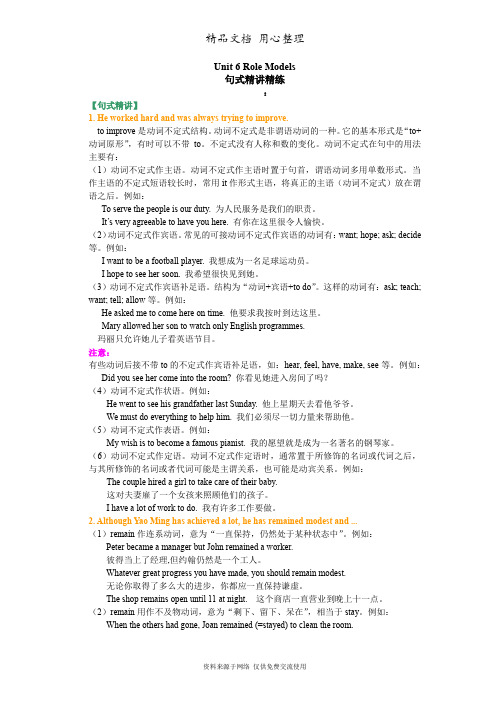
Unit 6 Role Models句式精讲精练:【句式精讲】1. He worked hard and was always trying to improve.to improve是动词不定式结构。
动词不定式是非谓语动词的一种。
它的基本形式是“to+动词原形”,有时可以不带to。
不定式没有人称和数的变化。
动词不定式在句中的用法主要有:(1)动词不定式作主语。
动词不定式作主语时置于句首,谓语动词多用单数形式。
当作主语的不定式短语较长时,常用it作形式主语,将真正的主语(动词不定式)放在谓语之后。
例如:To serve the people is our duty. 为人民服务是我们的职责。
It’s very agreeable to have you here. 有你在这里很令人愉快。
(2)动词不定式作宾语。
常见的可接动词不定式作宾语的动词有:want; hope; ask; decide 等。
例如:I want to be a football player. 我想成为一名足球运动员。
I hope to see her soon. 我希望很快见到她。
(3)动词不定式作宾语补足语。
结构为“动词+宾语+to do”。
这样的动词有:ask; teach; want; tell; allow等。
例如:He asked me to come here on time. 他要求我按时到达这里。
Mary allowed her son to watch only English programmes.玛丽只允许她儿子看英语节目。
注意:有些动词后接不带to的不定式作宾语补足语,如:hear, feel, have, make, see等。
例如:Did you see her come into the room? 你看见她进入房间了吗?(4)动词不定式作状语。
例如:He went to see his grandfather last Sunday. 他上星期天去看他爷爷。
北师大版初中英语七年级下册知识讲解-Unit 6 The Animal Kingdom(句式)

Unit 6 The Animal Kingdom(句式)句式精讲精练::句式精讲1. John and Anthony looked after Christian very well.look after意为“照顾,照看”,相当于take care of。
例如:My father is ill, so I have to look after him at home. 我父亲病了,所以我得在家照顾他。
She is old enough to look after herself. 她长大了,能够照顾自己了。
【拓展】look at=have a look at看look over检查look up(在字典等)查找look for寻找look forward to期待,盼望look around环顾2. Clearly, he could not live with John and Anthony any more, so they took him to Africa. not…any more意为“不再”。
not常位于be动词、情态动词或助动词之后,any more常位于句末,相当于no more。
no more常位于句中,放在be动词之后,实义动词之前,两者经常可以互换。
例如:He doesn’t live here any more. = He no more lives here. 他不再住在这里了。
【拓展】表示“不再”的词还有not…any longer或no longer。
二者的区别在于:(1) not…any more = no more,表示数量或程度上的“不再”增加,通常修饰终止性动词。
例如:The baby isn’t crying any more. = The baby is no more crying. 这个婴儿不再哭了。
(2) no longer = not…any longer表示时间或距离上的“不再”延长,通常修饰延续性的动词。
北师大版八年级英语上册 Unit 6 笔记
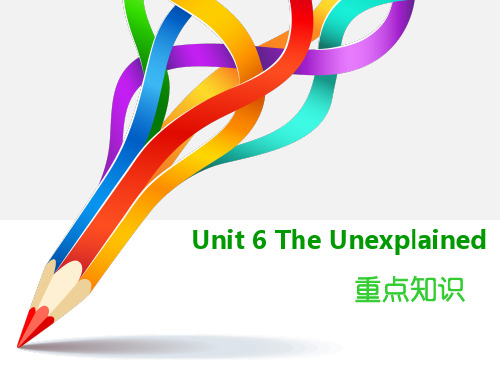
三、知识梳理
三、知识梳理
3. dream 的用法 dream n. 梦想: I have a dream. 我有一个梦想。 dream v. 做梦,dream of/ about 梦到: Sometimes we dream about forgetting a test. 有时候 我们梦见忘记测试。 4. It is difficult to prove sth. 很难证明某事 例如:We have some ideas but it’s really difficult to prove how and why we dream. 5. Our brains are active when we’re asleep. active(活跃的), aleep(熟睡的)在这里都是形容词, 充当表语,通常放在be动词后面。但是,不能作定语。例如, 不能说 an asleep girl,而要说 a sleeping girl。
Unit 6 The Unexplained
重点知识
No matter how hard it is, just keep going because you only fail when you give up. 无论多么艰难,都要继续向前,因为只有你 放弃的那一刻,你才输了。 It doesn’t matter how many times you fail, what matters is how many times you stand up and try again. 失败多少次不重要,重要的是你能重新站起 来多少次,并继续前进。
一、重点短语
21、be on holiday 在度假 22、most of 大多数 23、take out 拿出 24、take sb. for a walk 带某人散步 25、on the other side 在另一边
北师大版高中英语选择性必修2 UNIT 6 单元重点回顾

5.it引导分裂句 It was I who met Tom in the park yesterday. 是我昨天和汤姆在公园相遇的。
二、used to和would 1.相同点:都可用来表示过去经常性或习惯性的动作,常常可以换用;都不能 用来表示动作发生的具体频度或具体的一段时间。
10.cut out 切断;停止;关掉;删去
cut down 把……砍倒;割掉
cut in 插嘴,打断;插队
cut off 切下;切断;阻挡
cut up 切成小块;切碎
11.witness vt.亲身经历;目击 n.目击者;证人
be(
a ) witness to sth 目击,看见(某事发生)
bear/give witness to sth 为……作证;证明
My mother would scold me for forgetting things. 妈妈老是责骂我忘事情。
本课结束
witness sth 目击某事发生;是发生……的时间(或地点)
12.spot n.地点;斑点;污迹 vt.发现;注意到;看出,认出
on the spot在现场;当下;当场
hit the spot发挥正当作用;适得其用;恰到好处
spot sb doing sth发现某人做某事
13.go through遭受,经历;仔细察看,检查;(法律、合同等正式)通过 go across 穿过,横过 go out 走出,出去;熄灭 go over 搜查,检查 14.suitable adj.合适的,适宜的 suit vt.适合;使适宜 n.一套外衣;套装 suitably adv.合适地;适宜地;适当地 be suitable for/to 适合于 be suitable to do sth 适合做某事 suit...to...使……适合于……
九年级英语全册 Unit 6 重点词组 (新版)北师大版

Unit 6语法:动词不定式Lesson16 Yao Ming1.Win one’s respect赢得---的尊重2.Face difficulties面对困难3.Enter the NBA draft参加NBA选拔赛4.Despite +n/doing即使,尽管5.Score a career high of forty-one points 获得了职业生涯中的最高分41分6.Bread the record打破纪录7.Have a challenging start有一个挑战性的开始8.Deal with cultural differences应对文化差异9.Pay off for sb回报某人10.Think of sb as ---把某人认为成--11.At least至少12.Promise to do sth答应做某事13.Value sb as---把某人(珍视)视为----14.Work hard刻苦训练15.Remain modest保持谦虚16.Be known for因----做准备17.At least 至少18.Not---any more不再Lesson 17 People in Our Lives1.tell the truth说实话2.Go hiking去远足3.Give some examples举例子4.In one’s seventies在某人70多岁的时候5. Would you please ----你愿意做---?6.A good role model一个好榜样7.Look down upon看不起,轻视8.Be different from与---不同9.Everyday life日常生活10.Return to返回Lesson 18 Steve Jobs1.his early life and education他早期的生活和教育2.Digital products数码产品3.Part of---的一部分4.Without difficulties没有困难5.Grow up长大6.Formal schooling正规的学校教育7.Afford to do sth付的起钱做某事8.Get a degree得到学位9.Set up建立10.Be fired被炒鱿鱼11.A number of大量的12.Such as 例如13.Put up with忍受14.Recognise sb as---把某人认为成---15.The father of the digital revolution数码产品之父16.Change our way of life改变了我们的生活方式17.Birth mother亲生母亲18.Suit sb.适合某人19.Give up放弃20.Continue his education继续他的教育21.All the time总是,一直22.Struggle with与---斗争23.Graduate from从---毕业24.Stick to坚持,遵守25.Ask for help求助26.Take a break休息27.Switch off关闭Communication Workshop1.set a good example for为--树立榜样2.Learn from--向某人学习3.Beyond her years超越了她的年龄ed to do sth过去常常做某事5.Share with和某人分享6.Cut---into把---切成--7.Prepare for为--做准备。
北师大版八年级上册英语 Unit 6 词汇和语法基础(解析版)
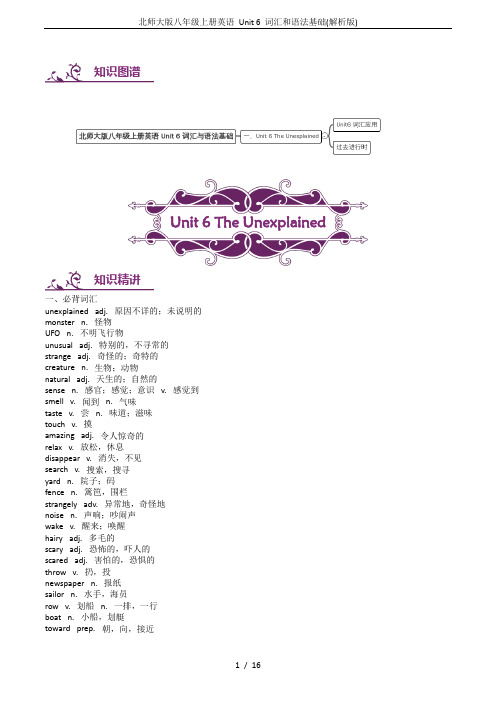
The sun disappeared behind a cloud.
太阳躲到了云彩的后面。
3. search verb /sɜːtʃ/
1). to look somewhere carefully in order to find something
搜查;搜索
例句:
The police searched the woods for the missing boy.
警察在树林中搜寻失踪的孩子。
He searched (in/through) his pockets for some change.
他翻遍口袋想找些零钱。
2). to look for information on a computer, the internet, etc.
1). as found in nature and not involving anything made or done by people
天然的,非人为的;非人造的
例句:
He died from natural causes (= because he was old or ill).
他是自然死亡。
pyjama n.睡衣裤
二、重点词汇
1. unexplained adjective /ʌnɪkˈspleɪnd/
Unexplained events, behaviour, etc. are ones for which people do not know or understand the reason.
wake v.醒来;唤醒
hairy adj.多毛的
scary adj.恐怖的,吓人的
高中北师大版英语必修二unit6
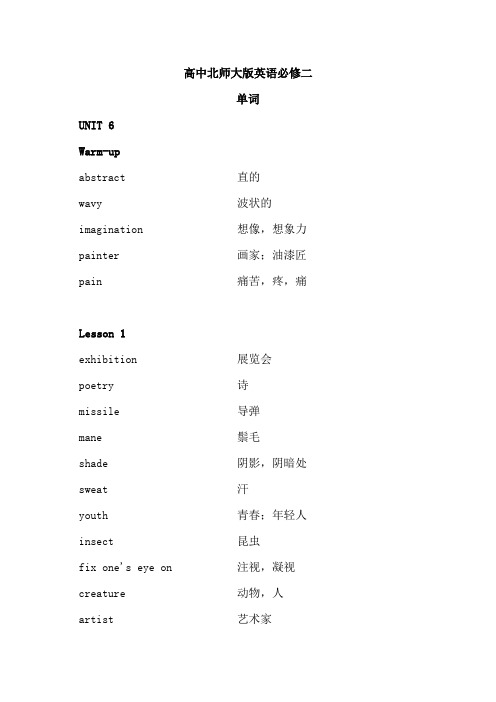
高中北师大版英语必修二单词UNIT 6Warm-upabstract 直的wavy 波状的imagination 想像,想象力painter 画家;油漆匠pain 痛苦,疼,痛Lesson 1exhibition 展览会poetry 诗missile 导弹mane 鬃毛shade 阴影,阴暗处sweat 汗youth 青春;年轻人insect 昆虫fix one's eye on 注视,凝视creature 动物,人artist 艺术家valuable 贵重的,有价值的typical 典型的elegantly 优美地emphasise 强调detail 细节,详情cloth 布,布料fold 皱褶shallow 浅的shore 岸边eyesight 视力Lesson 2marble 大理石concrete 混凝土feature 特色,特点balcony 阳台roof 房顶statue 雕像castle 城堡shyscraper 摩天大楼angel 天使architect 建筑师ruin 毁坏,毁灭loch 湖;海湾fairytale 童话granite 花岗石sort of 有几分地café咖啡Lesson 3phoenix 凤凰rooster 公鸡bat 蝙蝠tomb 坟墓date back to 追溯到dynasty 朝代,王朝religious 宗教的,虔诚的purpose 目的,意图pattern 式样,模式character 字,字体happiness 幸福temple 庙宇,寺庙offering 供品,祭品relate to 把……联系起来jewellery 珠宝try out 试验,试用Lesson 4cottage 村舍。
小屋rent 租金landlord 房东worm 虫pipe 管子mercy 慈悲,怜悯,同情心washroom 洗手间damp 潮湿的bathtub 浴缸,澡盆basement 地下室bathe 洗澡;沐浴fence 栅栏,围墙narrow 狭窄的hold one's breath 屏住呼吸garage 车库garbage 垃圾,废物apartment 公寓subway 地铁downtown 市区的lorry 卡车curtain 窗帘Communication Workshopair conditioner 空调conclusion 结论;结束Vocabulary in the songsstare 凝视,注视cozy 舒适,安逸的illuminate 照明,照亮fiery 燃烧的,如火的gem 宝石,珠宝短语fix one’s eyes on 注视,凝视a number of 许多at high speed 高速work as 做…工作be deep/ lost in thought 陷入沉思add… to… 增添,增加choose to do 选择做…leave sb/ sth doing 让(某人/某事物)处于某状态Sort of 有点,稍微be situated 位于with a long history 有悠久的历史according to 根据…be used for… 做…用be used as 把…用作put up 贴for the same reason 同样的道理a third 又一,再一suggest doing 建议做…hopefully 有希望地leave out 省略in the shape of 以…形状be made out of 以…制作It seems (that)… 似乎that’s why… 那就是为什么…take a bath 洗澡dream up 梦想hold one’s breath 屏住呼吸句型及讲解1.Qi Baishi’s style of painting often leaves the audience guessing and makes them use their imagination.齐白石的绘画作品常给观赏者留出运用想像力解读其内涵的余地【句法分析】这是一个leave,即leave+宾语+宾语补足语的句式,其中leave的语意为“使……处于某状态”。
北师大版必修第二册unit6重点句型归纳总结

UNIT 6 THE ADMIRABLE1.Do you have someone in mind that you admire?你心目中有崇拜的人吗?(教材p.103)2.But why do you think firefighters are admirable people?但是你为什么认为消防员是令人钦佩的人呢?(教材p.103)3.In 1969,Tu Youyou was chosen to establish a team to find a cure for malaria—a disease that killed millions of people every year.1969年,屠呦呦被选中成立一个团队,寻找疟疾的治疗方法。
疟疾这种疾病每年会导致数百万人死亡。
(教材p.53)4.Malaria kills over 1,000,000 people a year—more people than any disease apart from AIDS.疟疾每年夺去100多万人的生命——除了艾滋病,比任何疾病都多。
(教材p.52)5.The woman was Tu Youyou,the first Chinese female scientist to be awarded a Nobel Prize for her work.这位女士就是屠呦呦,是中国第一位获得诺贝尔奖的女科学家。
(教材p.52)6.When thanking the Committee for the honour,Tu Youyou said...在感谢委员会给予自己这项荣誉的时候,屠呦呦说……(教材p.53)7.This is not only an honour for myself,but also recognition and encouragement for all scientists in China.这不仅是我个人的荣誉,也是对中国所有科学家的认可和鼓励。
北师大版英语七年级下册Unit 6单词及短语
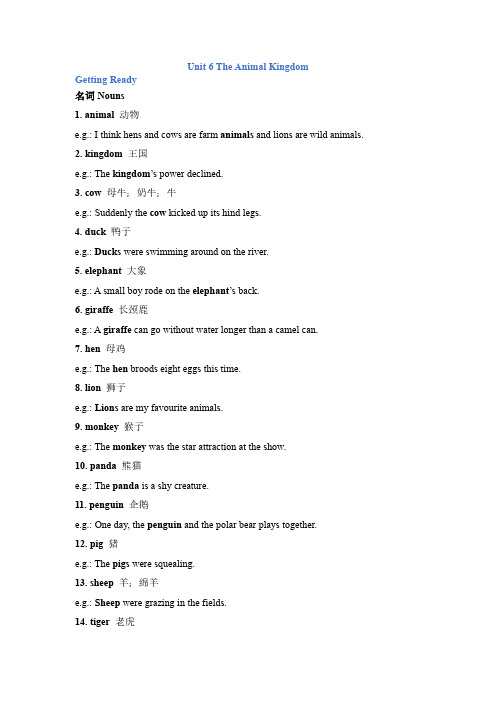
Unit 6 The Animal KingdomGetting Ready名词Nouns1. animal动物e.g.: I think hens and cows are farm animals and lions are wild animals.2. kingdom王国e.g.: The kingdom’s power declined.3. cow 母牛;奶牛;牛e.g.: Suddenly the cow kicked up its hind legs.4. duck鸭子e.g.: Ducks were swimming around on the river.5. elephant大象e.g.: A small boy rode on the elephant’s back.6. giraffe长颈鹿e.g.: A giraffe can go without water longer than a camel can.7. hen母鸡e.g.: The hen broods eight eggs this time.8. lion狮子e.g.: Lions are my favourite animals.9. monkey猴子e.g.: The monkey was the star attraction at the show.10. panda熊猫e.g.: The panda is a shy creature.11. penguin企鹅e.g.: One day, the penguin and the polar bear plays together.12. pig猪e.g.: The pigs were squealing.13. sheep羊;绵羊e.g.: Sheep were grazing in the fields.14. tiger老虎e.g.: She’ll fight like a tiger to protect her children.15. farm农场e.g.: He is part owner of a farm in France.兼类词Words with Multiple Part of Speech1. wild adj. 自然生长的,野生的n.野生环境e.g.: This region is the home of many species of wild flower.Lesson 16 My Favourite Animal名词Nouns1. rabbit兔子e.g.: The rabbits are bred for their long coats.2. mouse老鼠;鼠标e.g.: A cat often plays with a mouse before the kill.3. snake蛇e.g.: The snake sheds its skin once a year.4. scientist科学家e.g.: He is a writer first and a scientist second.形容词Adjectives1. cute 可爱的e.g.: She wasn’t beautiful. But she was kind of cute.2. helpful有用的;有益的e.g.: She made helpful comments on my work.3. ugly丑陋的,难看的e.g.: I never want to see his ugly mug again.4. useful有用的;有益的e.g.: He might be useful to us.5. blind盲的;失明的e.g.: They can also help blind people.Lesson 17 Interesting Animals名词Nouns1. body身体e.g.: Penguins look funny with their big bodies, small heads, short necks and short legs.2. part部分e.g.: We spent part of the time in the museum.3. ear耳朵e.g.: Elephants have big ears and long noses.4. eye眼睛e.g.: Giraffes have big eyes on a small head and they can see very well.5. head头e.g.: She nodded her head in agreement.6. neck脖子e.g.: With their long necks, it is difficult to drink water.7. mile英里e.g.: Some can swim 25 miles an hour.8. ground地面e.g.: When they sleep, they sit on the ground and rest their heads on their backs.9. horse马e.g.: You can’t find horses or sheep on our farm.动词Verbs1. lay 产卵,下蛋;放置e.g.: Penguins lay eggs in big groups and sometimes, there are over 100,000 of them.2. spread展开;张开;传播e.g.: They have to spread their front legs wide and bend their necks, so their heads can reach the ground.3. bend(使)弯曲e.g.: He bent and kissed her.4. reach足够达到;达到;到达e.g.: They didn’t reach the border until after dark.5. hold抓住;抱住;托住e.g.: Elephants can hold things with their noses.形容词Adjectives1. still 静止的;平静的e.g.: They stand still for a long time, so they can keep their eggs warm on their feet.2. fat肥的;肥胖的e.g.: You’ll get fat if you eat so much chocolate.3. dear亲爱的e.g.: He’s one of my dearest friends.副词Adverbs1. easily 容易地;轻易地e.g.: Monkeys can move from tree to tree easily.兼类词Words with Multiple Part of Speech1. wide adv.尽可能远地;充分地adj.宽阔的;宽的e.g.: Sam has a wide mouth.Lesson 18 An Animal Story名词Nouns1. baby婴儿e.g.: They saw a cute little baby lion in a shop in London.动词Verbs1. grow 生长;种植e.g.: However, he grew quickly.2. become 开始变得;变成e.g.: Soon, he became very big.3. recognise认出;意识到e.g.: He still recognised them and ran over, but he was too big and he knocked them down easily.4. hurt伤害;疼痛e.g.: He didn’t hurt them.5. hug拥抱,搂抱e.g.: He hugged them warmly.6. believe相信e.g.: They couldn’t believe it!7. leave离开e.g.: They were sad to leave him, but they were also happy to see Christian live freely in Africa.8. feel感到;觉得e.g.: The heat made him feel faint.9. climb攀登;爬e.g.: She climbed up the stairs.副词Adverbs1. even 甚至;还e.g.: They drove him around the city in their car and even took him to the beach.2. happily快乐地;高兴地e.g.: Christian lived with them happily for about a year.3. finally终于;最终e.g.: It took a long time, but they finally found Christian with a few other lions.4. suddenly突然;猛然e.g.: Christian walked over slowly. Then suddenly, he recognised them!5. warmly温暖地e.g.: He greeted all the guests warmly as they arrived.6. freely不受限制地;自由地e.g.: The sheep are allowed to roam freely on this land.兼类词Words with Multiple Part of Speech1. few det., adj.很少;有些e.g.: Few people understand the difference.短语Expressions1. look after 照顾;照料e.g.: They looked after Christian very well.2. a few有些;一些e.g.: I made only a few small changes to the report.Communication Workshop名词Nouns1. parrot鹦鹉e.g.: It was a loud parrot!2. koala考拉e.g.: The koala is listed among Australia’s endangered animals.形容词Adjectives1. huge 巨大的e.g.: It was huge but only two pandas lived there.2. hungry 饥饿的e.g.: I guess it was hungry and it wanted our sandwiches.兼类词Words with Multiple Part of Speech1. through prep.穿过;通过;自始至终adv.通过;自始至终e.g.: The sand ran through my fingers.2. guide n.导游;手册;指南v.指引;指导e.g.: We hired a local guide to get us across the mountains.短语Expressions1. all the time 一直e.g.: They were tired and slept all the time.。
北师大版英语八年级上册Unit 6单词及短语
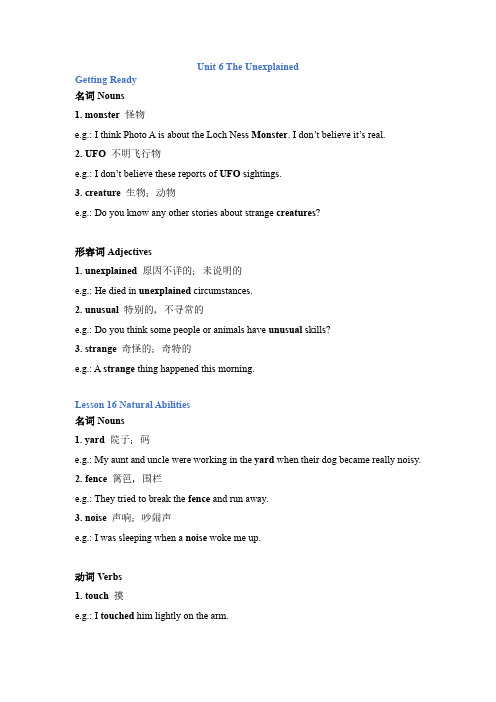
Unit 6 The UnexplainedGetting Ready名词Nouns1. monster怪物e.g.: I think Photo A is about the Loch Ness Monster. I don’t believe it’s real.2. UFO不明飞行物e.g.: I don’t believe these reports of UFO sightings.3. creature 生物;动物e.g.: Do you know any other stories about strange creatures?形容词Adjectives1. unexplained 原因不详的;未说明的e.g.: He died in unexplained circumstances.2. unusual特别的,不寻常的e.g.: Do you think some people or animals have unusual skills?3. strange奇怪的;奇特的e.g.: A strange thing happened this morning.Lesson 16 Natural Abilities名词Nouns1. yard院子;码e.g.: My aunt and uncle were working in the yard when their dog became really noisy.2. fence篱笆,围栏e.g.: They tried to break the fence and run away.3. noise声响;吵闹声e.g.: I was sleeping when a noise woke me up.动词Verbs1. touch 摸e.g.: I touched him lightly on the arm.2. relax放松,休息e.g.: We were relaxing at a coffee shop near the road because my mum and dad weren’t feeling very well.3. disappear消失,不见e.g.: He ran after it and disappeared.4. search搜索,搜寻e.g.: We searched for him for hours.5. wake醒来;唤醒e.g.: I always wake early in the summer.形容词Adjectives1. natural 天生的;自然的e.g.: My hair soon grew back to its natural colour.2. amazing令人惊奇的e.g.: It’s amazing how quickly people adapt.副词Adverbs1. strangely 异常地,奇怪地e.g.: The animals kept acting strangely.兼类词Words with Multiple Part of Speech1. sense n.感官;感觉;意识v.感觉到e.g.: I can hardly believe the evidence of my own senses.2. smell v.闻到n.气味e.g.: He said he could smell gas when he entered the room.3. taste v.尝n.味道;滋味e.g.: This dish has an unusual combination of tastes and textures.Lesson 17 True Stories?名词Nouns1. newspaper报纸e.g.: It appeared in a newspaper in 1934.2. sailor水手,海员e.g.: In 1966, two British sailors – John Ridgway and Chay Blyth – were rowing across the Atlantic Ocean in a small boat.3. boat小船,划艇e.g.: You can take a boat trip along the coast.4. side边缘;一边,一侧e.g.: It came toward the boat, dived under it and came up on the other side after some time.动词Verbs1. throw 扔,投e.g.: After a while, he threw a stone at him.2. dive跳水,潜水e.g.: We dived into the river to cool off.形容词Adjectives1. hairy 多毛的e.g.: He was tall and hairy.2. scary恐怖的,吓人的e.g.: It was a really scary moment.3. scared害怕的,恐惧的e.g.: He got scared.4. imaginary想象中的,虚构的e.g.: Are their sentences real or imaginary?介词Prepositions1. toward 朝,向,接近e.g.: This is an important step toward lower interest rates.兼类词Words with Multiple Part of Speech1. row v.划船n.一排,一行e.g.: We sat in a row at the back of the room.Lesson 18 Dreams名词Nouns1. brain脑e.g.: She is best known for her work on the human brain.2. human人e.g.: For humans, there are some common dreams.3. radio无线电广播e.g.: I listen to the radio on the way to work.4. pyjama睡衣裤e.g.: He stood yawning, his pyjama jacket gaping open.动词Verbs1. might 可能;可以e.g.: He said he might come tomorrow.2. prove 证明,证实e.g.: What are you trying to prove?3. realise意识到,领会e.g.: I didn’t realise that. Animals dream, too!形容词Adjectives1. asleep 睡着的e.g.: When I was asleep, I dreamt about flying.2. common普通的,常见的e.g.: One common dream people have is about forgetting a test.副词Adverbs1. probably 很可能e.g.: You’re probably right.短语Expressions1. right now 现在;立刻,马上e.g.: He is not at home right now.2. in fact事实上,实际上e.g.: In fact, our brains are active even during sleep.Communication Workshop短语Expressions1. wake up 叫醒;醒来e.g.: After that, I woke up.。
Unit6TheAdmirableLesson1重点句子背诵版高中英语北师大版(2019)
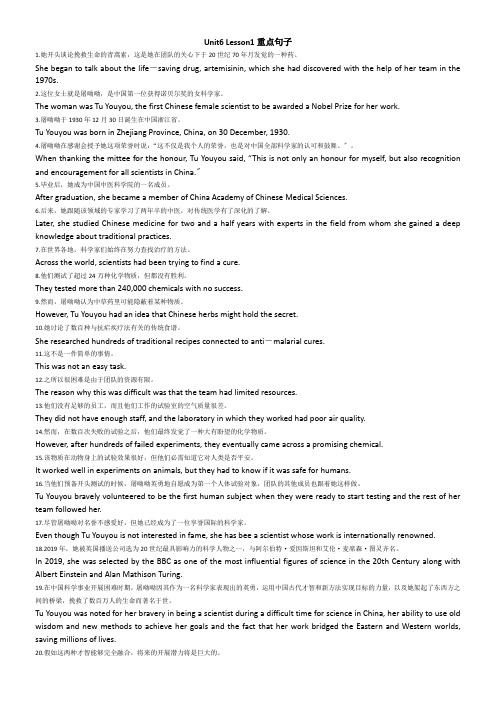
Unit6 Lesson1重点句子1.她开头谈论挽救生命的青蒿素,这是她在团队的关心下于20世纪70年月发觉的一种药。
She began to talk about the life-saving drug, artemisinin, which she had discovered with the help of her team in the 1970s.2.这位女士就是屠呦呦,是中国第一位获得诺贝尔奖的女科学家。
The woman was Tu Youyou, the first Chinese female scientist to be awarded a Nobel Prize for her work.3.屠呦呦于1930年12月30日诞生在中国浙江省。
Tu Youyou was born in Zhejiang Province, China, on 30 December, 1930.4.屠呦呦在感谢会授予她这项荣誉时说:“这不仅是我个人的荣誉,也是对中国全部科学家的认可和鼓舞。
〞。
When thanking the mittee for the honour, Tu Youyou said, “This is not only an honour for myself, but also recognition and encouragement for all scientists in China.〞5.毕业后,她成为中国中医科学院的一名成员。
After graduation, she became a member of China Academy of Chinese Medical Sciences.6.后来,她跟随该领域的专家学习了两年半的中医,对传统医学有了深化的了解。
Later, she studied Chinese medicine for two and a half years with experts in the field from whom she gained a deep knowledge about traditional practices.7.在世界各地,科学家们始终在努力查找治疗的方法。
- 1、下载文档前请自行甄别文档内容的完整性,平台不提供额外的编辑、内容补充、找答案等附加服务。
- 2、"仅部分预览"的文档,不可在线预览部分如存在完整性等问题,可反馈申请退款(可完整预览的文档不适用该条件!)。
- 3、如文档侵犯您的权益,请联系客服反馈,我们会尽快为您处理(人工客服工作时间:9:00-18:30)。
I.选择填空:45’1.You are looking out of the window again. Why are you so _______ about what is happening outside?A. eagerB. curiousC. anxiousD. interested2.Look, a lot of policemen are ________ the village for the thief who stole a lot of money from this bank.A. lookingB. searching forC. huntingD. searching3.Look, the mountain in front of us is indeed high _______ steep, take care when you climb it.A. as well asB. besidesC. butD. except4.It is said that his carelessness and ignorance together ________ a terrible fire, which burned down the building.A. resulted inB. resulted fromC. turned outD. worked out5.It is well-known that vegetables ________ a great deal of vitamin, which is very useful to us.A. includeB. keepC. containD. exist6.Being lack of food, a good many people in that country _______ hunger at the end of last year.A. died fromB. died toC. died forD. died of7._______ entering the tall building, he heard a sharp cry coming out of it, which brought his heart to his mouth.A. UponB. AtC. InD. With 8.Shortly after he got back from abroad, he fell ill ________ a cold and had to lie in bed for almost a whole week.A. at B .in C. with D. on9.---Where are the students in your class?---Some students are playing football on the playground, but I don’t know where ______ are.A. the othersB. othersC. anothersD. the anothers10.---It is a very fine day, I think.---Yes. A bit cold, _______.A. althoughB. insteadC. thoughD. however11.It was on October 1st, 1949 _______ he joined the party _________ he was killed by the enemy soldiers.A. when, thatB. that, whenC. when, whenD. that, that12.---What do you think of the girl?--Not only _______ well but also ________ modest.A. she works, she isB. does she work, she isC. does she work, is sheD. she works, is she13. I don’t believe in her, because what she says seldom ________ what she does.A. followsB. agreesC. matchesD. catches14. He appeared the moment I referred to his mistake, which I was really ________ about.A. ashamedB. embarrassedC. shyD. sorry15. The young reporter risked ________ to interview an important official of that country in war.A. shootingB. being shotC. to be shotD. to shoot16. She has many good friends, ________ are really kind to her and her parents.A. most of themB. but most of themC. and most of whomD. most of whom 17.It has been very hot these days. I’m afraid your food can’t ________ for a long time.A. stay freshB. be stayed freshC. be staying freshD. stay freshly18. ---How can I ________ to keep healthy?--I suggest your ________ in the stadium every day.A. drop weight, exercisingB. miss weight, taking exerciseC. lose weight, working outD. gain weight, working out19.Our work was badly done, and we were really ________ of it.A. ashamedB. anxiousC. worriedD. uncertain20. Our teacher told us to ________ our beliefs so that we could do something in our life.A. workB. doC. liveD. make21. Hasn’t the $10 you lent me ________ ?A. been paid backB. paid forC. paid offD. been paid for22. We must ________ our eyes from dust and the sun in the open air.A. shutB. protectC. keepD. prevent23.________helping them we are helping to save ourselves.A. WithB. ForC. OfD. By24.His carelessness ________ the forest fire should have been avoided.A. resulting inB. caused byC. being broughtD. led to25.________ with flying, walking is much slower.A. ComparingB. ComparedC. To comparepare26. Write a story ________ the stories you and your classmates have acted out.A. is based onB. basing onC. which based onD. based on27. The man _________ at the meeting is a very famous writer.A. referred toB. who refers toC. referring toD. refers to28. If _________ more time, I could have finished the task much better.A. being givenB. givenC. gives meD. giving29. The Song Dynasty __________ three great inventions to world civilization.A. contributedB. discoveredC. inventedD. devoted30. It was the best result that they’ve ________ had.A. neverB. onceC. evenD. ever31. She wore beautiful ________ round her neck.A. jewelsB. jewelriesC. jewelD. necklace32. Every time _________ I saw him, he was working hard.A. thatB. in whichC. /D. for which33. The teacher asked a second question _________ I could answer the first one.A. beforeB. afterC. whenD. as34. Nice _________ considerate, our new teacher soon gained our respect.A. as good asB. as far asC. as long asD. as well as35. The paper will become useless _________ into pieces.A. after tearingB. when being tornC. after tornD. when torn36. Lying in bed, we listened to the heavy rain ______ the window.A. hittingB. knockingC. beatingD. striking37. The students _______ busily when I went to get a book I _______ in the office.A. had written ; leftB. were writing; have leftC. had written; had leftD. were writing; had left38.—Oh, it’s you. I ________ you.--It’s not surprising you didn’t. I’ve just had my hair dyed red.A. didn’t recognizeB. hadn’t recognizedC. haven’t recognizedD. don’t recognize39. The police found that the house ____ and a lot of things _________.A. has been broken into; stolenB. had broken intoC. has broken into; has stolenD. had been broken into; stolen40. They asked me to have a drink with them. I said it was nine years since I _______ a gooddrink.A. enjoyedB. was enjoyingC. had enjoyed.D. had been enjoying41. Tom was disappointed that most of the guests _____when he _______ at the party.A. left; had arrivedB. had left; had arrivedC. left; arrivedD. had left; arrived42. By the time they arrived, I _______ everything ready.A. gotB. have gotC. had gotD. were getting43. By 1980, I _____ him for ten years; I met him for the first time in 1970.A. had knownB. have knownC. knowD. knew44. I .______ that we would be able to leave tomorrow, but it’s beginning to look difficult.A. hopeB. had hopedC. would hopeD. was hoping45. If Bernard _________ faster, everything would have been all right.A. walkedB. have walkedC. were walkingD. had walked1—5. BDAAC 6—10. DACBC 11—15. ABCBB 16-20. DACAC 21—25. ABDAB 26—30. DABAD 31—35. ACADD 36—40. CDADC 41—45. DCABD。
